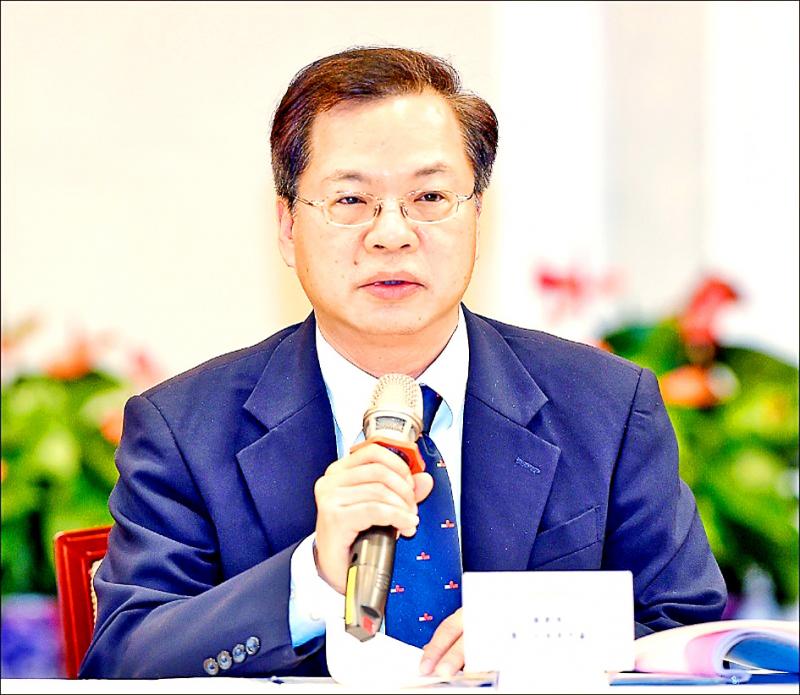National Development Council Minister Kung Ming-hsin (龔明鑫) is leading a delegation to the US to discuss exchanges on 5G development with tech giants including Microsoft Corp and Alphabet Inc’s Google.
The delegation departed on Saturday for the 11-day visit, with stops in San Francisco, Seattle and Washington, Kung said.
The 41-member NextGen Telecom Delegation is scheduled to visit Microsoft, Google and Amazon.com Inc to seek opportunities for 5G cooperation, Kung said.

Photo: Fang Pin-chao, Taipei Times
The council has been pushing a massive eight-year infrastructure plan under the Special Act on the Forward-looking Infrastructure Development Program (前瞻基礎建設特別條例), which was passed by the legislature 2017 and proposes investing up to NT$840 billion (US$28.26 billion) to bolster Taiwan’s 5G networks, among other projects.
Meanwhile, the government has initiated its Asian Silicon Valley plan to further secure Taiwan’s 5G development and localize the production of 5G equipment.
The delegation also plans to visit several US firms involved in the development of blockchain, composite materials and components, and 3D projection technologies.
The council said the delegation includes officials from the agency and the Ministry of Economic Affairs, as well as representatives from Taiwanese enterprises such as Chunghwa Telecom Co (中華電信), iPhone assembler Pegatron Corp (和碩), contract notebook computer maker Compal Electronics Inc (仁寶) and data center solution provider Quanta Cloud Technology Inc (雲達科技).
Kung said that Taiwan’s 5G development abilities would be enhanced if the visits encourage participation from US firms, and would carve a path for the development of artificial intelligence of things endeavors.
The council and the American Institute in Taiwan (AIT) is scheduled to hold a NextGen Telecom roundtable in Silicon Valley, where Taiwanese delegates are expected to meet with representatives from major US telecom equipment developers such as smartphone IC designer Qualcomm Inc, the council said, adding that AIT Director Sandra Oudkirk was instrumental in securing Taiwan’s participation in the forum.
The delegation also plans to visit officials in Washington state to discuss the 5G Open Innovation policy, the council said.
Kung and Minister Without Portfolio John Deng (鄧振中), Taiwan’s top trade negotiator, are to attend the SelectUSA Investment Summit in the US capital, an annual event sponsored by the US Department of Commerce that focuses on facilitating job-creating investment in the US market, the council said.
Kung is also to deliver speeches at two think tanks, the Global Taiwan Institute and the German Marshall Fund, to tout efforts between Taipei and Washington to build a resilient global supply chain and forge ties, the council said.
Kung is to conclude the US visit on Wednesday next week before he leads another Taiwanese delegation to Japan for exchanges on renewable energy development, such as hydrogen power and carbon capture, it said, adding that the Japan delegation is to comprise representatives of more than 30 Taiwanese start-ups.
Kung is scheduled to return to Taipei on July 6.

Intel Corp chief executive officer Lip-Bu Tan (陳立武) is expected to meet with Taiwanese suppliers next month in conjunction with the opening of the Computex Taipei trade show, supply chain sources said on Monday. The visit, the first for Tan to Taiwan since assuming his new post last month, would be aimed at enhancing Intel’s ties with suppliers in Taiwan as he attempts to help turn around the struggling US chipmaker, the sources said. Tan is to hold a banquet to celebrate Intel’s 40-year presence in Taiwan before Computex opens on May 20 and invite dozens of Taiwanese suppliers to exchange views

Application-specific integrated circuit designer Faraday Technology Corp (智原) yesterday said that although revenue this quarter would decline 30 percent from last quarter, it retained its full-year forecast of revenue growth of 100 percent. The company attributed the quarterly drop to a slowdown in customers’ production of chips using Faraday’s advanced packaging technology. The company is still confident about its revenue growth this year, given its strong “design-win” — or the projects it won to help customers design their chips, Faraday president Steve Wang (王國雍) told an online earnings conference. “The design-win this year is better than we expected. We believe we will win

Quanta Computer Inc (廣達) chairman Barry Lam (林百里) is expected to share his views about the artificial intelligence (AI) industry’s prospects during his speech at the company’s 37th anniversary ceremony, as AI servers have become a new growth engine for the equipment manufacturing service provider. Lam’s speech is much anticipated, as Quanta has risen as one of the world’s major AI server suppliers. The company reported a 30 percent year-on-year growth in consolidated revenue to NT$1.41 trillion (US$43.35 billion) last year, thanks to fast-growing demand for servers, especially those with AI capabilities. The company told investors in November last year that

Power supply and electronic components maker Delta Electronics Inc (台達電) yesterday said it plans to ship its new 1 megawatt charging systems for electric trucks and buses in the first half of next year at the earliest. The new charging piles, which deliver up to 1 megawatt of charging power, are designed for heavy-duty electric vehicles, and support a maximum current of 1,500 amperes and output of 1,250 volts, Delta said in a news release. “If everything goes smoothly, we could begin shipping those new charging systems as early as in the first half of next year,” a company official said. The new